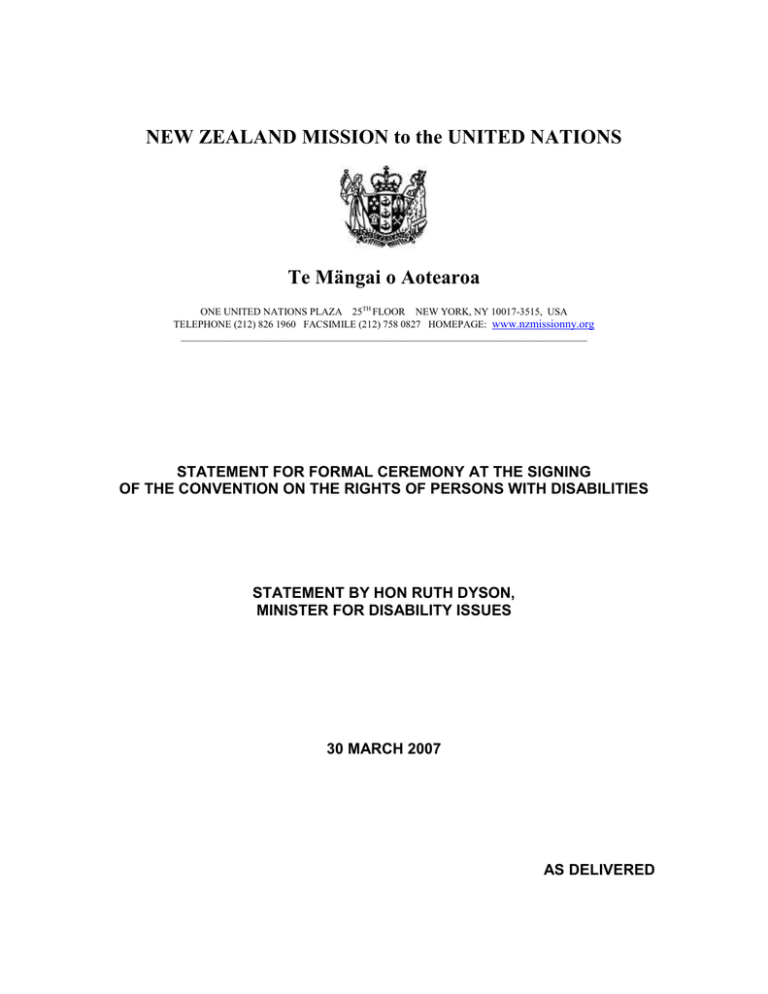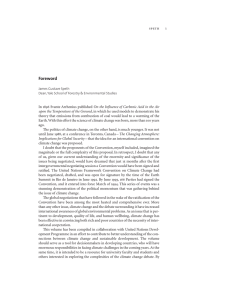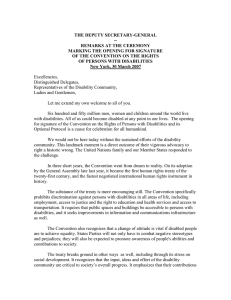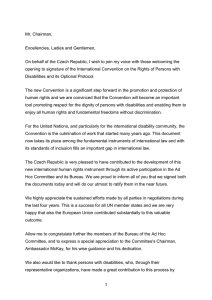New Zealand - Morning speech
advertisement

NEW ZEALAND MISSION to the UNITED NATIONS Te Mängai o Aotearoa ONE UNITED NATIONS PLAZA 25TH FLOOR NEW YORK, NY 10017-3515, USA TELEPHONE (212) 826 1960 FACSIMILE (212) 758 0827 HOMEPAGE: www.nzmissionny.org _________________________________________________________________________________ STATEMENT FOR FORMAL CEREMONY AT THE SIGNING OF THE CONVENTION ON THE RIGHTS OF PERSONS WITH DISABILITIES STATEMENT BY HON RUTH DYSON, MINISTER FOR DISABILITY ISSUES 30 MARCH 2007 AS DELIVERED 2 Madame President, New Zealand is honoured to be participating in the opening of this signature ceremony. It is an honour to have been closely involved, along with so many other States, in the development of this important new Convention on the Rights of Persons with Disabilities. The opening of this Convention for signature is, in many respects, the end of a process begun over 5 years ago by member States of the United Nations, including those of us signing the Convention today. It is the end of a much longer process undertaken by the international community of persons with disabilities, in persuading States that a new human rights convention was required. It is the end result of the remarkable negotiating partnership between civil society and States which followed, and it bears the firm imprint of civil society. We all owe the disability movement a lot in bringing us to this point. The signing of the Convention by so many States today reflects a high level of commitment to the Convention, and the principles enshrined in it. I understand that this is the highest number of States ever to sign a human rights convention on the opening day. It is a good indication that States will move quickly to ratification and to bring the Convention into force. It is important to bring the Convention into force as quickly as possible, so as to fill the gaps that exist without it and to redress some of the discrimination and injustices that persons with disabilities have faced over many years. With 20 States Parties required to bring the Convention into force, the threshold is relatively low, and I wish to acknowledge those States which are already able to ratify. Those of us not able to ratify today will need to move quickly to consider the steps necessary to do so, including enacting any necessary legislation and taking the required constitutional or administrative measures. I have no doubt that governments will have already turned their attention to this and that other Ministerial colleagues already have it in their minds, as I do. In addressing ratification, governments will look carefully at the obligations in the Convention. This is quite a complex and detailed Convention. There is good reason for that. In contributing to its negotiation, organisations of persons with disabilities had at the front of their minds the practical problems faced by their constituencies. They wanted to ensure that real world problems were carefully dealt with in the Convention, and that it rose above the theoretical. Just as the Convention itself is the product of a remarkable partnership between governments and civil society, effective implementation will require a continuation of that partnership. The Convention is quite specific in requiring governments to actively involve disability organisations in the development of policies and action to implement this Convention. But governments need to move beyond the black letter of the law, and ensure that this happens in a meaningful way. 3 Effective implementation will also benefit from international cooperation between governments. Every government deals domestically with matters relating to disability. These are not matters for just some States and not for others. All of us work hard to respond as best we can, irrespective of our national circumstances and our resources. We are all trying to develop best practice. We can learn an immense amount from each other. The Committee on the Rights of Persons with Disabilities established under the Convention will have an important role in helping us, as the Committee guides us all in the best ways of implementing the Convention. But this needs to be supplemented through the excellent linkages among disability organisations. Direct cooperation between States will also play an important role. The international cooperation provision in the Convention is an important one, and we will need to ensure the effective mainstreaming of disabilities issues into development assistance programmes. We all have an interest in ensuring that all States are as well placed as possible to move quickly and effectively in implementing the Convention. As we mark the end of one process, in opening the convention for signature here today, we all look forward to the next processes: of bringing the Convention into force, and of effective and meaningful implementation. The Convention provides the benchmark for action. It is incumbent upon us all, governments and civil society, in partnership, to ensure that it fully lives up to expectations. Thank you.




